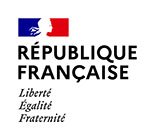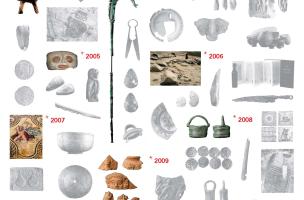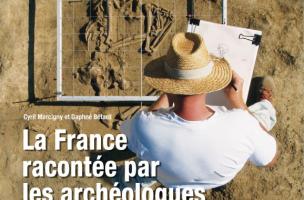Search
You are here
2002-2012: Inrap is ten years old
The National Institute for Preventive Archaeological Research celebrates ten years of archaeological discoveries.
Post date
15 March 2012
Last modified
19 January 2017
From 2002 to 2011 its archaeologists will have carried out 16,978 evaluations over an area of 112,241 hectares and effectuated 2,237 excavations in Mainland France and in the Overseas Departments. This intense activity of "safeguarding through study" the archaeological heritage affected by regional development has been accompanied by a harvest of noteworthy discoveries and a considerable renewal of our knowledge of the past, from the Palaeolithic Age to the first half of the 20th century.
In 2012 Inrap is the largest archaeological research structure in Europe. The Institute counts more than 2,000 collaborators. Its budget of 168.8 M€ finances the realisation of 78,600 evaluation days, of 186,100 excavation days, of 18,600 research days and of 3,700 days of diffusion of the results to the public. An important scientific and editorial programme accompanies this tenth anniversary.
In 2012 Inrap is the largest archaeological research structure in Europe. The Institute counts more than 2,000 collaborators. Its budget of 168.8 M€ finances the realisation of 78,600 evaluation days, of 186,100 excavation days, of 18,600 research days and of 3,700 days of diffusion of the results to the public. An important scientific and editorial programme accompanies this tenth anniversary.
The creation of Inrap
Created on February 1st 2002 enforcing the law on Preventive Archaeology, it is a public establishment placed under the control of the Ministries responsible for Culture and Research and has a triple mission : it operates evaluations and excavations; it assures the scientific exploitation of their results ; it contributes to the teaching, the cultural diffusion and the promotion of archaeology.
Ten years of construction
From 2002 to 2011, Inrap has progressively built itself up in: organization, management, human resources, research policies, and cultural promotion …
After some early difficulties in 2002 and 2003, Inrap adapted itself of the new system set up by the law of August 1st 2003, opening the realisation of evaluations to territorial communities and that of excavations to public and approved private operators. Apart from its missions as a preventive archaeological operator, Inrap has a specific national mission of research and of diffusion of archaeological knowledge.
In 2002, the Institute equipped itself with a scientific and technical department, then in 2004 with a scientific council, to carry out its research missions. In 2004, Inrap elaborated a project of establishment, at the end of a wide participatory study. In 2005, the Institute equipped itself with a department of cultural development, in order to carry out its missions of cultural diffusion. The same year, Inrap defined its main areas of research. In 2009, the Institute opened a website on Internet with spaces showing its scientific research and undertook the digitisation of excavation reports (at present 400 available and consultable). In 2010, Inrap elaborated a plan "Winning back the developers" to answer the needs of developers and to confront the rise of competition. In 2011, the Institute signed with the State a contract of performance for the years 2011-2013. It was recapitalized to the extent of 21 M€ to correct the absence of specific funds at its creation.
The scientific and technical department is equipped with a service of international activities and a service of archaeological goods and documentation, a service of sub-aquatic and underwater activities is planned. Lastly, the Institute created the collection "Recherches archéologiques". Since 2005, Inrap has made a special effort to modernise its forty or so territorial implantations in Mainland France and in the Overseas Departments. From 2002 to 2011, to accompany this growth in activity, its numbers have passed from 1,672 to 2,323 agents (that is the equivalent of 2,012 full time at the end of 2011).
After some early difficulties in 2002 and 2003, Inrap adapted itself of the new system set up by the law of August 1st 2003, opening the realisation of evaluations to territorial communities and that of excavations to public and approved private operators. Apart from its missions as a preventive archaeological operator, Inrap has a specific national mission of research and of diffusion of archaeological knowledge.
In 2002, the Institute equipped itself with a scientific and technical department, then in 2004 with a scientific council, to carry out its research missions. In 2004, Inrap elaborated a project of establishment, at the end of a wide participatory study. In 2005, the Institute equipped itself with a department of cultural development, in order to carry out its missions of cultural diffusion. The same year, Inrap defined its main areas of research. In 2009, the Institute opened a website on Internet with spaces showing its scientific research and undertook the digitisation of excavation reports (at present 400 available and consultable). In 2010, Inrap elaborated a plan "Winning back the developers" to answer the needs of developers and to confront the rise of competition. In 2011, the Institute signed with the State a contract of performance for the years 2011-2013. It was recapitalized to the extent of 21 M€ to correct the absence of specific funds at its creation.
The scientific and technical department is equipped with a service of international activities and a service of archaeological goods and documentation, a service of sub-aquatic and underwater activities is planned. Lastly, the Institute created the collection "Recherches archéologiques". Since 2005, Inrap has made a special effort to modernise its forty or so territorial implantations in Mainland France and in the Overseas Departments. From 2002 to 2011, to accompany this growth in activity, its numbers have passed from 1,672 to 2,323 agents (that is the equivalent of 2,012 full time at the end of 2011).
Ten years of research
In ten years, Inrap has devoted 134,762 workdays to the scientific exploitation of the results of the archaeological operations. The display of the scientific exploitation of the results of the archaeological operations is accompanied by methodological monitoring and a harmonization of practices. An active documentary policy is engaged to put the results of research at the disposition of the scientific community.
A scientific programming defines the different areas including all periods from the Palaeolithic to modern times. Two "National Inquiries" have inventoried the recent data on the Bronze and Iron Ages. Archéopages, a quarterly scientific review of the Institute has seen its formula renewed around the theme of "Archaeology and Society".
Inrap runs the European project "Archaeology in contemporary Europe" and directs a five-year programme of excavations in Angkor. Its researchers have intervened in 50 countries. Almost 300 Inrap archaeologists participate in teams associating the University and the CNRS. Since 2002, they have published more that 2,000 books and articles.
A scientific programming defines the different areas including all periods from the Palaeolithic to modern times. Two "National Inquiries" have inventoried the recent data on the Bronze and Iron Ages. Archéopages, a quarterly scientific review of the Institute has seen its formula renewed around the theme of "Archaeology and Society".
Inrap runs the European project "Archaeology in contemporary Europe" and directs a five-year programme of excavations in Angkor. Its researchers have intervened in 50 countries. Almost 300 Inrap archaeologists participate in teams associating the University and the CNRS. Since 2002, they have published more that 2,000 books and articles.
An active cultural Policy
Cultural diffusion, a new mission for Inrap, has developed over a broad spectrum. To present the excavations to the public, 700 "open days" on the sites and 600 lectures have been organized. Forty-two books have been published aimed at the general public. 250 exhibitions have been co-produced in partnership with the communities and the developers. Numerous production initiatives have enabled the realisation and the diffusion of ten long and medium length documentary films, thirty short and ten animated films. The website proposes more that a hundred and twenty reports, twelve thematic files, nine atlases and an library of images giving access to 2,300 documents that can be downloaded free of charge. It attracts 100,000 visitors a month. Inrap has organized nine conferences in partnership with great institutions. Lastly, the Institute is at the origin of the "Journées nationales de l’Archéologie"(National Archaeology Days), a national event organised by the Ministry of Culture and Communication, of which the third edition will take place on 22-24 June 2012.
Events
This tenth anniversary is accompanied by an important editorial programme and scientific and cultural events, with notably the publication in March 2012 of "La France racontèe par des archèologues" (France narrated by archaeologists) Gallimard Editions, and a conference on the archaeology of colonial slavery in the Musèe du Quai Branly in May.
Contact(s) :
Vincent Charpentier
Director of media and partnerships Inrap,
cultural development and communication
01 40 08 80 16
vincent.charpentier [at] inrap.fr



